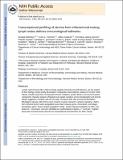Transcriptional profiling of stroma from inflamed and resting lymph nodes defines immunological hallmarks
Author(s)
Regev, Aviv; Immunological Genome Project Consortium
DownloadRegev_Transcriptional profiling.pdf (4.657Mb)
OPEN_ACCESS_POLICY
Open Access Policy
Creative Commons Attribution-Noncommercial-Share Alike
Terms of use
Metadata
Show full item recordAbstract
Lymph node stromal cells (LNSCs) closely regulate immunity and self-tolerance, yet key aspects of their biology remain poorly elucidated. Here, comparative transcriptomic analyses of mouse LNSC subsets demonstrated the expression of important immune mediators, growth factors and previously unknown structural components. Pairwise analyses of ligands and cognate receptors across hematopoietic and stromal subsets suggested a complex web of crosstalk. Fibroblastic reticular cells (FRCs) showed enrichment for higher expression of genes relevant to cytokine signaling, relative to their expression in skin and thymic fibroblasts. LNSCs from inflamed lymph nodes upregulated expression of genes encoding chemokines and molecules involved in the acute-phase response and the antigen-processing and antigen-presentation machinery. Poorly studied podoplanin (gp38)-negative CD31− LNSCs showed similarities to FRCs but lacked expression of interleukin 7 (IL-7) and were identified as myofibroblastic pericytes that expressed integrin α7. Together our data comprehensively describe the transcriptional characteristics of LNSC subsets.
Date issued
2012-04Department
Massachusetts Institute of Technology. Department of BiologyJournal
Nature Immunology
Publisher
Nature Publishing Group
Citation
Malhotra, Deepali, Anne L Fletcher, Jillian Astarita, Veronika Lukacs-Kornek, Prakriti Tayalia, Santiago F Gonzalez, Kutlu G Elpek, et al. “Transcriptional profiling of stroma from inflamed and resting lymph nodes defines immunological hallmarks.” Nature Immunology 13, no. 5 (April 1, 2012): 499-510.
Version: Author's final manuscript
ISSN
1529-2908
1529-2916